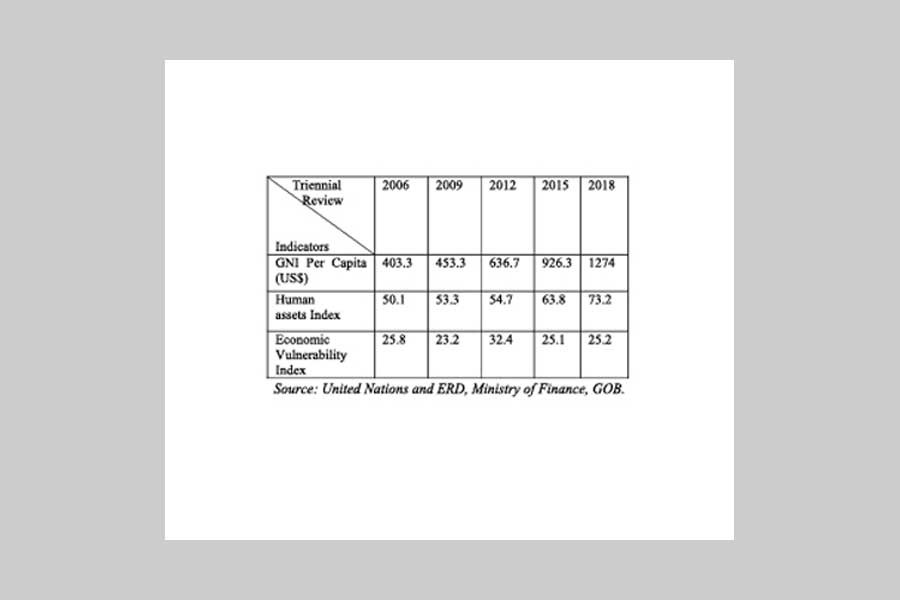The UN Committee for Development Policy (CDP) visited Dhaka from 9 to 12 October, 2017 to discuss the country's prospect of graduation from the least developed country (LDC) category. The member of the CDP met with officials from different ministries, the Bureau of Statistics and the Prime Minister's Office, as well as with private sector representatives and a research institute focusing on LDC-related issues. The CDP has conveyed its decision to Bangladesh's Permanent Representative to the UN. On March 16, 2018, the declaration of Banhladesh's graduation was made public. This graduation process started in 2015 when the country upgraded itself to the World Bank's "lower middle income" category by increasing its Gross National Income (GNI).
United Nations introduced the LDC category in 1971 when there were 25 LDCs all over the world. After 47 years, this number has now increased to 47, and of them 36 are WTO members. Only five countries were able to graduate from the LDC group, including Botswana, Cape Verde, Maldives, Samoa and Equatorial Guinea. Seven countries (Bhutan, Kiribati, Nepal, Sao Tome of Principe, Solomon Islands, Timor-Leste, Tuvalu) met two criteria during the 2015 triennial review. Bangladesh met all three criteria for graduation including GNI per capita, Human Assets Index, (HAI) and Economic Vulnerability Index (EVI).
According to the UN's graduation threshold, the GNI per capita of a country has to be $1,230 or above. According to the UN's CDP, Bangladesh's GNI per capita is now $1,274. In terms of the HAI, a country must have a score of 66 or above. Bangladesh's score is now 73.2 which is well above the threshold. The HAI, it may be noted, is an indicator of nutrition, health, adult literacy and secondary school enrolment rate. In the context of economic vulnerability index (EVI), a country's score has to be 32 or below. Bangladesh's score is 25.2 in the EVI, an indicator of environmental, economic structure, natural and trade-related shocks.
According to the World Bank, Bangladesh is the only country to have met all the three criteria to graduate from the LDC bloc.
It is understood that the CDP will review Bangladesh's progress in 2021, and the country's official graduation from the LDC category will take place after two triennial reviews. If the country maintains its position in all the three categories for the next six years, i.e two triennial reviews, it will graduate from the LDC bloc. There will be two more reviews in 2021 and 2024 to ensure graduation from the LDC list.
CHALLENGES AFTER GRADUATION
After graduation, there would be many challenges facing the country in various spheres such as -- banking, trade, overseas aids and gfrants, and areas related to technical cooperation.
l Duty Free Quota Free (DFQF) Market Access: Once the country gets out of the LDC bloc, hopefully, in 2024, it will have to grapple with problems in the form of losing GSP (genaralised system of preference) facility that provides duty-free access of all Bangladeshi products (except arms) subject to fulfillment of Rules of Origin and quality standard requirements mainly to the EU markets for our export products and duty-free and quota-free market access currently available in other markets. Although the preferential facilities will not go overnight, as some grace period would be available following graduation, the challenge remains and the country needs to prepare for it.
l TRIPS (Trade Related Aspects of Intellectual Property Rights) Implementation: LDCs are exempted from implementing the TRIPS agreement other than those containing the core non-discrimination principles (Articles 3, 4 and 5).Transition period for LDCs concerning patent protection of pharmaceutical products is upto 1 January 2033. LDCs are now exempted from providing patent protection for pharmaceutical products. But after graduation, Bangladesh as a graduated country needs to implement TRIPS and provide respective IPR protection.
l Export subsidies for non-agricultural products: According to the WTO Agreement on Subsidies and Countervailing Measures (SCM), LDC members have the flexibility to use export subsidies (Article. 27.2 and Annex VII).But after graduation Bangladesh will loss the flexibility to use export subsidies.
l Technical assistance: LDCs enjoy priority in the receiving WTO's technical assistance. WTO's Enhanced Integrated Framework (EIF): Aid for Trade programme is exclusively designed for LDCs. Once graduated, Bangladesh will have a short grace period to enjoy such technical assistance.
l Export Earning: A study of the Economic Relations Division in December 2017 has suggested that Bangladesh might lose close to $2.7 billion in export earnings every year once it graduates from the LDC bloc. This has persuaded the relevant authorities at the Prime Minister's Office and in the Ministries of Commerce, Finance, Planning and Industry to urge the private sector to give importance to the diversification of exports in the following sectors - agriculture and agricultural processed goods, pharmaceuticals and leather.
The Readymade Garments (RMG) is the most powerful export-oriented sector which has been receiving incentives, subsidies and tax benefits since last three decades. Still, this sector is demanding incentives now and then. After graduation from the LDC bloc, Bangladesh will not be allowed to continue with such generous incentives or subsidies. Country's trade policy makers and businesses need to understand the long-term implication of subsidies and incentives.
Despite some of the above-mentioned constraints, macro-economic performance in Bangladesh is set to remain robust in the upcoming years and inflation is projected to be stable.
The country is advancing steadily but the steps are not perfect. Political stability, transparency in decision-making, accountability in implementing development projects, judicial reforms, monitoring in banking sector and curbing corruption are some of the core areas demanding attention in order to sustain the growth in an inclusive manner.
Rafiqul Islam is Chief Operating Officer of Shimanto Bank, and ASM Ahsan Habib is Principal Officer of Uttara Bank Ltd. rafiqrodorshi@gmail.com


